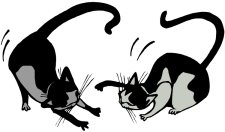 Funny stuff. To say that there's previous bad blood between Malmuth and Maroon understates the obvious, as each has taken healthy slaps at passages in the other's poker-strategy works. Last year Malmuth wrote a dismissive non-review comment of Maroon's work which contained the following:
Funny stuff. To say that there's previous bad blood between Malmuth and Maroon understates the obvious, as each has taken healthy slaps at passages in the other's poker-strategy works. Last year Malmuth wrote a dismissive non-review comment of Maroon's work which contained the following:"The fee for me to go through your book and explain all the errors in it to you would be very high, well into the five figures. But for someone who makes hundreds of thousands of dollars a year it should be something that you would want to do.
"Of course, these figures are just pocket change to me and I would probably assign this task, assuming you came up with the money, to someone like Ed Miller, but you would still learn a lot."
Hell, if someone gave me that type of holier-than-thou crap, I'd take a potshot at him when the chance arose --- as it did for Maroon recently when he posted about a seriously flawed passage in Malmuth's Hold'Em Poker for Advanced Players, currently the working bible for poker-bot programmers and other mechanical players everywhere. The passage deals with raising from the big blind pre-flop in shorthanded or loose play, then checking after the flop, a questionable maneuver which Malmuth wrote should be done roughly 40% of the time. (I gave my copy of Advanced to a new player a couple of months ago, so I can't quote it directly.) But here's Maroon's return cannon shot over the bow:
"It's unusual to find people who reraise out of the big blind and then check 40% of the time (with their best and worst 20% of hands), as almost everyone who has worked their way up to those stakes [30/60] knows they should be betting 100%, but they do exist and now I know why."
Game on --- and you should enjoy the spittle-fest for yourself.
It's obvious that Malmuth's advice as stated is wrong, yet his ego won't allow him to admit to it in the thread. My favorite part of the exchange is this:
"That is the section that is getting referenced is arguing for looseness not tightness. We use the term "at least 40 percent" and implied the right percentage could be quite a bit higher. How high depends on how well you play compared to your opponent. If you are the better player, it could indeed be as high as 80 percent.
"The one key point is that surprisingly your overall results won't change that much between playing 45 percent of the hands and 80 percent of the hands because these extra hands are about break even.
"The reason why the book leans towards the tighter recommendation is because frankly we are protecting the less than expert reader from getting involved with hands that are only profitable for the best players.
"Best wishes,
"Mason"
That's not only deep; it's very, very brown. Apparently the "advanced" players catered to in the book's title are really the "less than expert reader(s)" Malmuth deems in need of protection, hence the difference between the 40% and 80% (or approaching 100%) participation figures discussed in the thread and referenced in Maroon's pointed comment. There's no poker play on earth where the difference in attempt frequency between an advanced player and an expert one should double. Splitting hairs? Certainly --- the very same hairs Malmuth sees fit to split to defend his work and preserve his haughtiness in the face of any who would beg to disagree.
We'll close with a different sort of point. All writers, poker or otherwise, need a healthy dose of ego to do what they do. One cannot survive without it. That said, there are huge numbers of quality poker books on the market, to the point that very few books are irreplaceable --- there's always some other book or combination of books on the market. I buy poker books all the time, and I have lots to choose from each time I do. And I'm pretty sure that for quite some time to come, I can find something to buy that doesn't enrich a pretentious jackass.

No comments:
Post a Comment